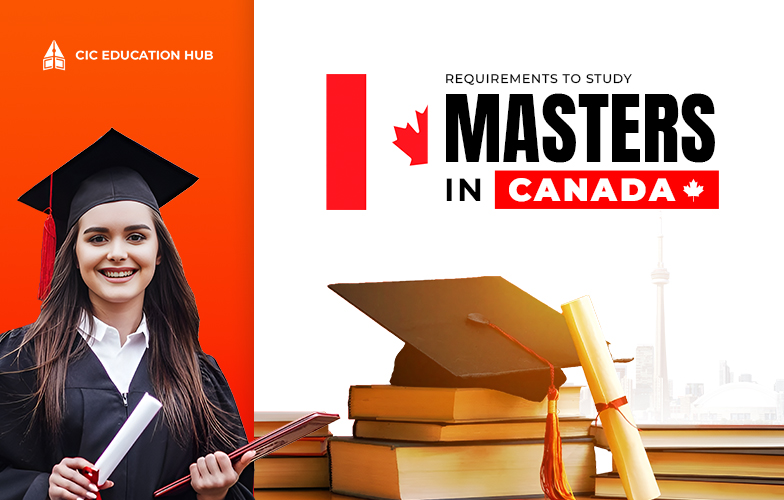Requirements to Study Masters in Canada

Are you considering pursuing a master’s degree in Canada? Canada has been a top destination for international students seeking a high-quality education and a diverse, welcoming environment. If you’re thinking about getting a master’s degree in Canada, it’s going to be an exciting journey.
In this blog, we’ll explain what you need to study in Canada, why it’s a great place for higher education, and requirements to study Masters in Canada.
Why Choose Canada for Your Master’s Degree?
There are many reasons why international students choose to pursue a master’s degree in Canada. Here are some of the top reasons:
- High-Quality Education: Canadian universities are famous for their tough academic requirements and outstanding professors. A master’s degree from a Canadian school is widely acknowledged and highly regarded worldwide.
- Diverse and Inclusive Culture: Canada is a very diverse and welcoming country where you can meet people from different backgrounds and cultures, which can make your learning experience more interesting.
- Better Work Opportunities: Canada offers post-graduation work permits (PGWPs) that allow international students to gain valuable work experience in Canada after completing their studies. This can be a stepping stone to permanent residency.
- Quality of Life: Canada is known for its high quality of life, with clean cities, beautiful landscapes, and a strong focus on environmental sustainability.
- Post-Graduation Opportunities: After receiving your degree, you can work in Canada under one of the many post-graduation work permits that are available.
Read More : Masters in Canada for Nepali Students: A Pathway to Excellence
What are the requirements to Study Masters in Canada?
To study for a master’s degree in Canada, you’ll need to meet certain requirements. These requirements may vary slightly depending on the university and program, but here some:
- Bachelor’s Degree: You must have obtained a bachelor’s degree from a recognized university, or its equivalent. The master’s program you want to pursue should be compatible with your degree.
- Academic Transcripts: As part of your application, you must submit your academic transcripts. Make sure they are officially translated and are in English, French, or both.
- Language Proficiency: Tests like the IELTS or TOEFL are required by the majority of Canadian universities as evidence of students’ English or French language proficiency. You might need to achieve a certain score.
- Letters of Recommendation: In most cases, you’ll need to submit letters of support from professors or other experts who can speak to your abilities both academically and personally.
- Statement of Purpose: A well-written statement of purpose outlining your academic and professional objectives is frequently required.
- Visa and Study Permit: In order to study in Canada, you must obtain a study permit. Depending on your home country, you might need an electronic travel authorization (eTA) or a temporary resident visa (TRV) to do this.
- Proof of Funds: You must show that you have enough money to pay for your tuition, living costs, and return travel.
- Health Insurance: In order to study in Canada, you must have health insurance. While some provinces provide free health care, others mandate private health insurance.
- Interviews: As part of the admissions process, you might occasionally be asked to attend an interview.
Cost of studying Master’s in Canada
Studying for a Master’s degree in Canada can be expensive, but how much you’ll pay depends on a few things. First, it depends on which university and program you pick. Second, your costs can change based on whether you’re a Canadian resident or an international student. Lastly, your personal expenses also play a role in how much you’ll need to spend. So, the cost can be quite different for everyone.
- Tuition costs: In Canada, tuition costs can differ significantly between universities and programs. The typical annual cost for domestic students (Canadian citizens and permanent residents) is between CAD 10,000 and 30,000. The annual tuition for international students can range from 15,000 to 50,000 Canadian dollars (CAD). The cost of programs in the humanities or social sciences is typically higher than those in industries like business, engineering, and medicine.
- Living costs: Depending on the city or province you choose to attend school in, the cost of living in Canada varies. The cost of living is typically higher in large cities like Toronto, Vancouver, and Montreal than in smaller towns. Budget between CAD 10,000 and CAD 15,000 annually on average for living expenses.
- Health Insurance: It is customary for international students studying in Canada to have health insurance. While some provinces offer coverage through their public health programs, others demand that students purchase private health insurance. The price can vary, but it’s a necessary outlay to take into account.
- Books and Supplies: You may need to set aside money for textbooks, supplies, and equipment depending on your program. This price range is very wide.
- Fees Not Listed: Universities may levie a variety of fees, including technology fees, student association fees, and application fees. When applying, make sure to ask about these additional fees.
- Scholarships and Financial Aid: Canada provides both domestic and foreign students with a variety of scholarships, grants, and financial aid options. To help with cost-saving, research these opportunities and submit an application.
Conclusion:
It can be an excellent decision getting a master’s degree in Canada, but it requires careful planning and preparation. You can improve your chances of being admitted to a Canadian university by fulfilling the academic, language, and financial requirements. Remember that Canada offers opportunities for personal and professional growth in a friendly and diverse environment in addition to academic opportunities. In order to make your dream of studying in Canada a reality, do extensive research on the programs and institutions you are considering, as well as start the application process well in advance.
FAQ’S
Can I work while studying in Canada?
Yes, you can work part-time during your studies and full-time during scheduled breaks on a study permit.
Are scholarships available for international students?
Yes, many Canadian universities offer scholarships and funding opportunities for international students based on academic merit or other criteria.
What is the minimum GPA required for admission to a Master’s program in Canada?
GPA requirements vary by university and program, but a competitive GPA is often around 3.0 on a 4.0 scale.
What documents are required for the application?
Common documents include transcripts, letters of recommendation, a statement of purpose, and a CV.
Can I apply for permanent residency after completing my Master’s in Canada?
Yes, Canada offers various immigration pathways for international students to apply for permanent residency.
How long does it take to complete a Master’s program in Canada?
Master’s programs typically take one to two years to complete, depending on the program and whether it’s full-time or part-time.


